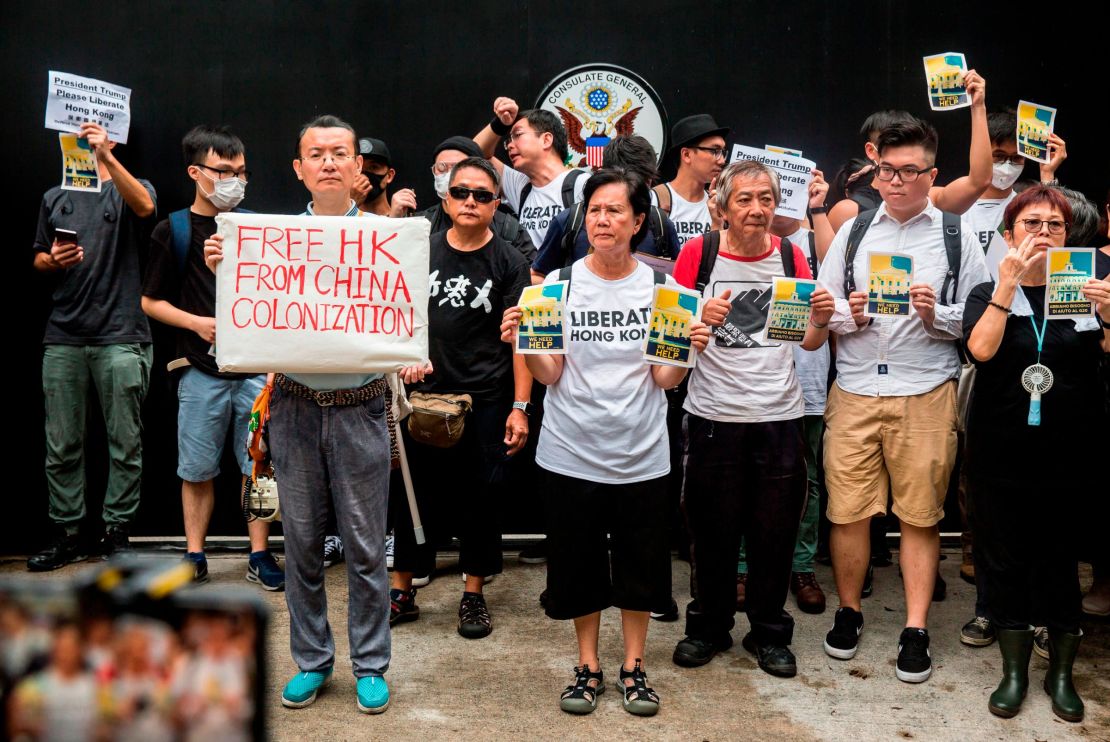Hong Kong protesters are appealing for foreign support in their fight for political freedom, calling on world leaders to act ahead of the summit of the Group of 20 major economies in Osaka, Japan, this week.
Hundreds of demonstrators rallied in the city center and marched to consulates of G20 nations, including the United States, the United Kingdom and Japan, to deliver letters urging leaders to back their bid for the full withdrawal of a controversial extradition bill.
Carrying signs reading “Liberate Hong Kong,” activists at an evening assembly, many of them wearing black, sang protest anthems and called on G20 leaders to defend their rights. The demonstrators hope their efforts will get the bill onto the G20 agenda, despite a top Chinese foreign ministry official saying that Beijing would not allow it.

Hundreds of thousands of people have taken to the streets in Hong Kong over the past two weeks to protest a government extradition bill, which many fear could be used to deport political activists and dissidents to mainland China.
Although city leader Carrie Lam announced over a week ago that the government would suspend the bill, opponents want to see it scrapped entirely. They are also calling for the police to be investigated for alleged brutality after officers fired rubber bullets and tear gas this month at a crowd that had surrounded the government headquarters.

It’s still unclear whether the issue will be brought up during the G20 talks, which will take place Friday and Saturday.
Last week, US Secretary of State Mike Pompeo said that he expected President Donald Trump to raise the protests with Chinese President Xi Jinping.
But at a briefing Monday, Assistant Minister of Foreign Affairs Zhang Jun said Beijing would “not allow” the protests to be discussed.
“Hong Kong affairs are Chinese domestic affairs. Any foreign force has no right to interfere in this,” Zhang said.
A month of protests
After the assembly wrapped Wednesday evening, a group of demonstrators continued their rally outside the Hong Kong Police Headquarters, unfurling a white banner that read “Release arrested protesters, f**k the popo.”
Police appealed to protesters not to block emergency vehicles or rescue services, calling on the crowd to act “peacefully and orderly when expressing their views.”
On at least three occasions this month, Hong Kong’s city center has been brought to a standstill by people protesting the bill. According to organizer estimates, two mass marches in June attracted over 1 million people in the city of 7 million.
The Legislative Council – Hong Kong’s Parliament – closed for a number of days in response to the protests.
June’s demonstrations have become a lightning rod for those concerned and angry about perceived diminishing freedoms and growing mainland Chinese presence in the city. The bill has also been met with opposition from Hong Kong’s traditionally conservative business community.
Although Hong Kong is part of China, it has different laws, a principle called one country, two systems. Many fear that the bill could be used to deport political activists and dissidents to mainland China, which does not have the same laws or freedoms as Hong Kong.
International support
A number of politicians have spoken out in support of Hong Kong’s protesters, and marches against the extradition bill have been held in other countries, including Australia.
On Tuesday, British Foreign Secretary Jeremy Hunt, candidate for leader of the Conservative Party and prime minister, said the UK would not issue any further licenses for crowd control equipment to Hong Kong until concerns about human rights and fundamental freedoms had been addressed.
Speaking in UK Parliament, Hunt said he had raised his concerns with Lam and urged the Hong Kong government to establish a robust, independent investigation into the violent protests this month.
The protesters have also drawn support from Taiwanese President Tsai Ing-wen, who tweeted that the people of Hong Kong are “not alone.”
CNN’s Sarah Faidell and Eliza Mackintosh contributed to this report.

